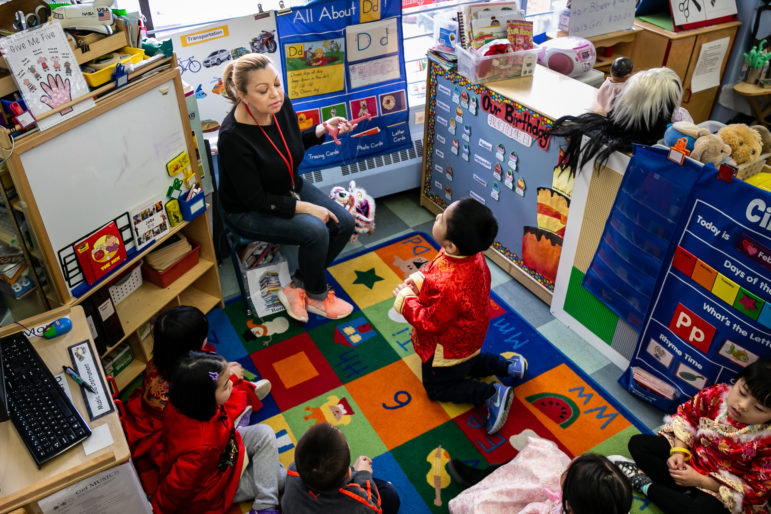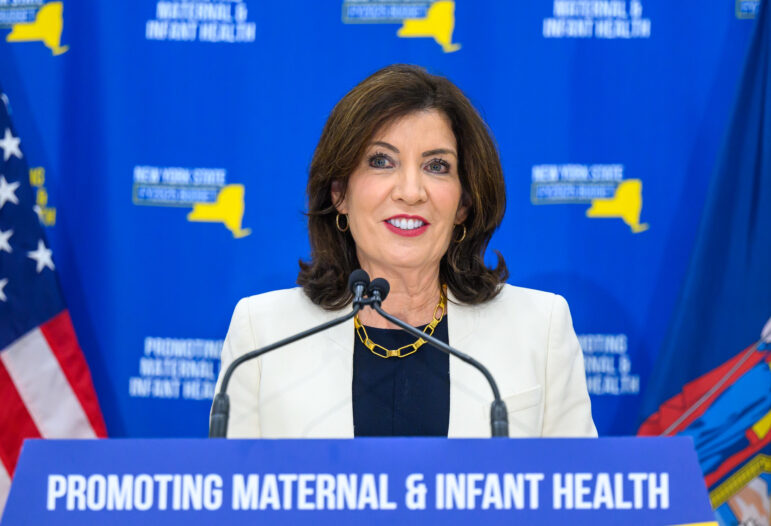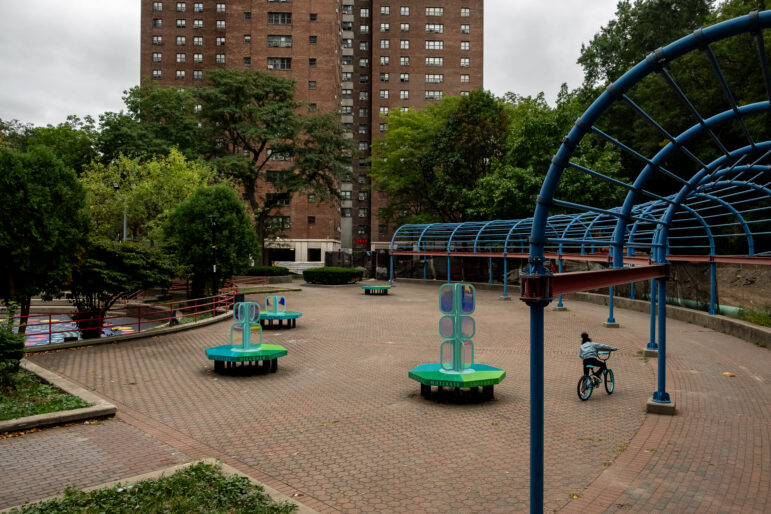The Coalition for the Homeless reached a settlement with the City of New York Friday, adding new emergency terms to the 1981 decree that paved the way for the city’s unique right to a shelter bed.
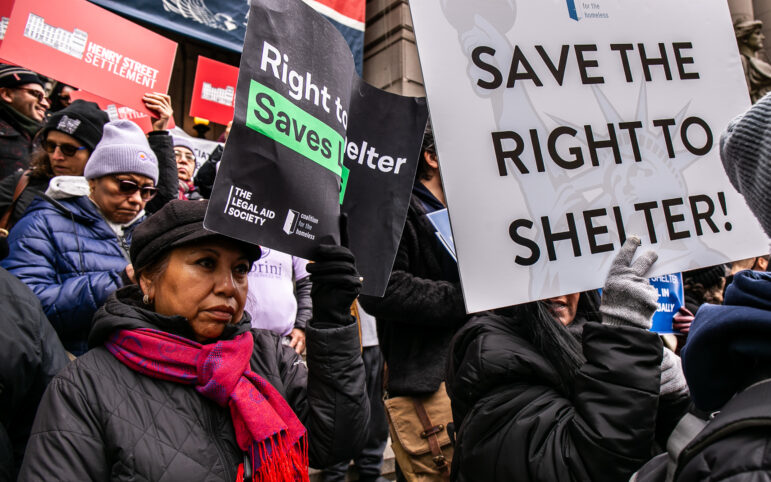
Adi Talwar
A rally to defend the Right to Shelter in front of the National Museum of the American Indian in Downtown Manhattan on Dec. 5, 2023.Adult migrants who wish to remain in New York City shelters following an initial 30- or 60-day period will now only be able to do so under “extenuating circumstances,” according to a settlement reached Friday between the city and advocates for unhoused New Yorkers. An exception will also be made for adults with disabilities.
For months, recently-arrived immigrants in need of a bed after an initial 30-day stint have been directed to the former St. Brigid School in the East Village, where thousands have waited for days on end for a new placement.
Before signing off on the agreement Friday afternoon, New York State Supreme Court Judge Gerald Lebovits stepped down from his bench in a packed Manhattan courtroom, solemnly shaking hands with the assembled lawyers before deeming the settlement a “model approach for our nation.”
The fate of New York City’s right to shelter for adults had been up in the air since last spring, when Mayor Adams first sought relief from the 1981 consent decree in Callahan v. Carey, a lawsuit that established the right to shelter for single men.
For decades, New York City has been uniquely obligated to provide a shelter bed to anyone in need—part of a set of rules that grew from the Callahan decree and subsequent court decisions. The organization Coalition for the Homeless is tasked with enforcing the decree on behalf of the unhoused.
But Mayor Eric Adams has long argued that an influx of recently-arrived immigrants since early 2022 has pushed New York City’s shelter system beyond capacity. There are now over 120,000 people staying in city shelters—about 64,600 of whom are asylum seekers, down from a recent peak of over 68,000 at the end of December.
While Adams has praised eviction policies for helping reduce the overall shelter population and lower the city’s cost burden, City Hall is not systematically tracking where people go when they leave the system, or if they land on their feet.
“The right to shelter was never intended to apply to large scale migrant populations arriving without housing or legal work status in such a short period of time,” Mayor Adams said in a pre-taped video address Friday. “This new agreement acknowledges the realities of where we are today.”
In mid-October, the last public court appearance in Callahan, the parties agreed to enter mediation. A few weeks prior, Mayor Adams had requested to suspend the bulk of the decree—pertaining to shelter access and standards for single adults—under proposed emergency circumstances.
Advocates had condemned the proposal to suspend shelter rights as extreme, arguing that it would result in people being turned out to the streets ahead of the cold winter months.
Following five months of weekly, closed-door talks, the city and the Coalition for the Homeless announced Friday that migrant adults under the age of 23 will receive an initial 60-day shelter placement, while those 23 and older will receive 30 days.
The agreement doesn’t impact families with minor children, who, if they live in shelters outside of the Department of Homeless Services system, are currently subject to 60-day shelter limits with a blanket right to reapply.*
Single adults and members of adult families who wish to remain in shelter will undergo an individualized assessment to determine if their circumstances merit an extension. Possible allowances spelled out in the settlement include proof that the person is moving into an apartment or leaving the city within a month, or has an impending court appearance.
“The agreement is to respond to this moment, this influx of new arrivals, and it will end when the current situation changes,” said Josh Goldfein of the Legal Aid Society, co-counsel for Coalition for the Homeless, addressing the court Friday.
Triggers to end the emergency period include Mayor Adams declining to renew an emergency declaration by executive order, or an agreement between the parties.
The settlement also includes exceptions to shelter limits for people recovering from, or preparing for, medical procedures, and gives the city discretion to keep sheltering people who have made “significant efforts” to resettle outside shelter, such as taking English classes, looking for a job or trying to find an apartment.
Migrants with disabilities can forgo the assessment, and the city is not obligated to offer an alternative placement if the first offer is declined, except to accommodate a disability or concern such as risk of domestic violence. Adults who return to the system because their housing falls through can be re-sheltered under certain circumstances.
Addressing reporters outside of the courthouse Friday, Deputy Mayor Anne Williams-Isom summarized the change. “We needed more flexibility,” she said.
“People will not be able to reapply unless there are extenuating circumstances,” she added.
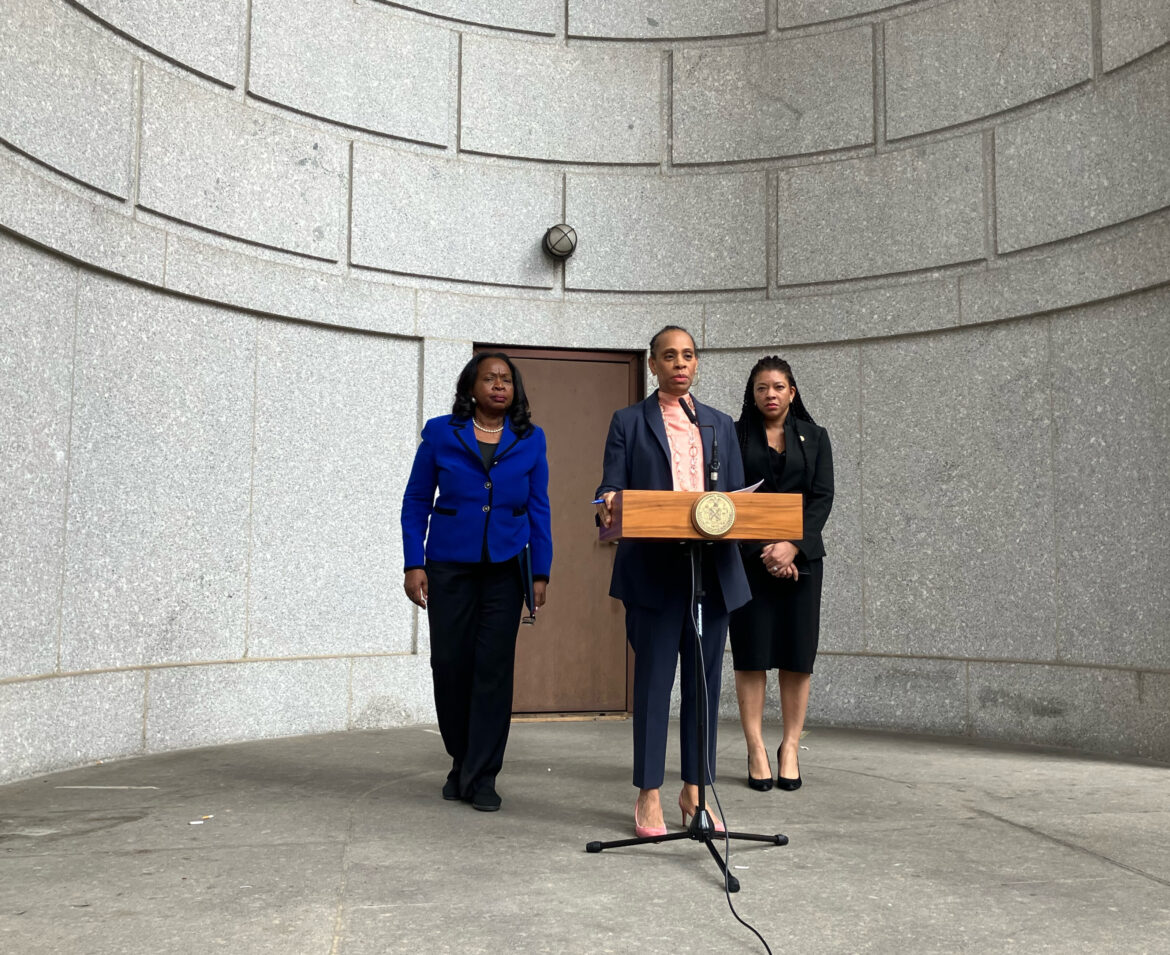
Emma Whitford
Deputy Mayor Anne Williams-Isom addressing reporters Friday outside court, flanked by Corporation Counsel Sylvia O. Hinds-Radix and Chief of Staff Camille Joseph Varlack.But Goldfein of Legal Aid framed the change as an improvement that could make it harder for the city to evict certain migrants.
“Currently what they do is at 30 days, they say your placement here is over no matter what unless you have a disability,” he said. “But everybody else, they say, ‘Sorry, you have to go to St. Brigid’s now to get a new placement.’”
“Under this new agreement, people will have the opportunity to say, ‘I need more time,’ and they can review that and make a determination of how much more time to give you, and then you wouldn’t have to leave,” he added.
There are currently about 2,700 adults who have sought a new shelter bed and are awaiting placement, according to City Hall. The city is operating so-called “waiting areas,” lacking beds, where people awaiting placement can stay overnight.
Under Friday’s settlement, one or more of these locations will remain open as “drop-in” centers for anyone who rejects a new placement, arrives during the middle of the night, or simply needs a place to be indoors. These will have showers, and offer meals.
Starting April 8, waiting areas will no longer be allowed to function as such, and anyone qualifying for shelter must have a spot meeting minimum standards, including cot, toilet and shower access.
In a statement following Friday’s announcement, Murad Awawdeh, president and CEO of the New York Immigration Coalition, offered a mixed review. On one hand, he said, the settlement establishes temporary terms rather than a permanent modification to Callahan, and preserves initial access to a shelter bed.
But it also singles out certain shelter-seekers.
“By specifically identifying single asylum seeking adults to be removed from shelters after 30 or 60 days without any true path to affordable housing, the Adams Administration creates a discriminatory practice that is not only immoral and antithetical to the intent of the Right to Shelter, but also short-sighted,” Awawdeh stated.
Going forward, Coalition for the Homeless and Legal Aid will be monitoring the implementation of Friday’s settlement, and will receive weekly reports on the immigrant shelter census from City Hall.
If the organization has concerns about potential violations, they can return to court. “The doors will be open,” Judge Lebovitz said Friday.
To reach the reporter behind this story, contact Emma@citylimits.org. To reach the editor, contact Jeanmarie@citylimits.org
Want to republish this story? Find City Limits’ reprint policy here.
*This story has been updated with information on circumstances for migrant families with minor children.


